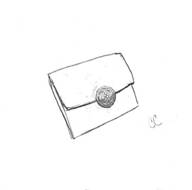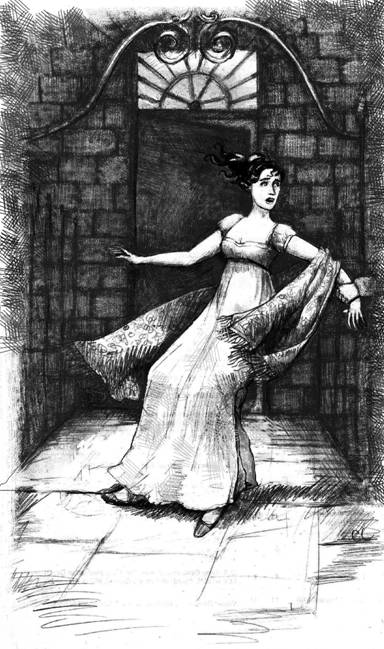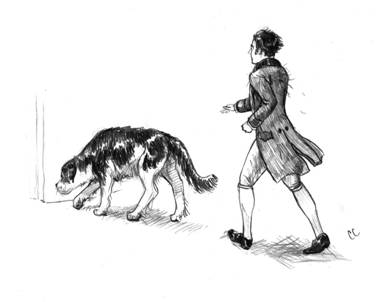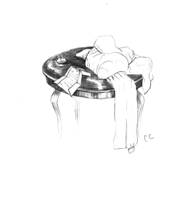There Must Be Murder (10 page)
Read There Must Be Murder Online
Authors: Margaret C. Sullivan
Tags: #jane austen, #northanger abbey, #austen sequel, #girlebooks

“And it gives Mrs. Findlay an excellent reason
to make false accusations,” said Henry. “You look troubled, my
sweet.”
“Miss Beauclerk also suggested that Sir Arthur
was a hard man,” said Catherine. “Could one of them have become
so
—” She shook her head. “Never mind! I should know better than to be
so fanciful.”

“Beware getting too close to the truth,” said
Henry. “Next you will receive a mysterious unsigned note warning
you off, and any heroine worth her smelling salts cannot resist
such a challenge. Matthew, you have done very well. I hope the
formation of your acquaintance with Miss—Biddy, was it?—was not
onerous.”
Matthew coughed and did not meet Henry’s eye; if
he had, he might have seen the teasing humor lurking there. “I did
my best to fulfill my duty, sir.”
“I hope your zealous pursuit of intelligence did
not lead you to make overhasty declarations. But if it has, we
shall make your lady welcome at Woodston. Mrs. Tilney has provided
for you; it was her word that saved the little cottage beyond the
orchard from being pulled down. It could be fitted up for a young
family, I dare say—”
“Oh, no, sir,” said Matthew, his face deep
red.
“Do not tease him, Henry,” said Catherine.
“Matthew deserves a much better wife than a mere maidservant who
cannot even be trusted to keep her employer’s secrets.”
“Thank you, ma’am,” said Matthew with a
gratified look.
Henry smiled, and said, “He does indeed deserve
better; and I know he will seek better.”
“I have no such plans at present, sir, to—seek,”
said Matthew, still blushing.
“A man never does,” said Henry.
***

The dark pressed in early, and even in the hour
before dinner, Catherine needed candles to light her sewing. Henry
had gone down to the kitchen to make sure MacGuffin had been
brushed, fed, and watered after his adventures of the morning. She
knew that Henry probably would end up brushing MacGuffin himself,
and get his coat all over dog hair, but such a circumstance was not
unusual and did not trouble her.
As was her custom while working, her mind ran on
other matters than the task at hand, and her needle slowed as she
considered all that had happened that day. When she had defended
Matthew, Catherine had spoken instinctively; she did not know
Matthew well. He was always pleasant and respectful, but his
disposition was not open. It had never before occurred to her to
wonder about his situation. He was Henry’s clerk, and wrote in a
strong, elegant hand, so clearly he was an educated man; but then
why had he been obliged to go into service? He had worked for Henry
since he had taken over the living at Woodston, and was always
there, dependable and steady, but so unobtrusive that she rarely
thought of him except when he was needed or present. She realized
she did not even know his surname.
Such an unremarkable young man—and yet so
completely capable of gaining access to Lady Beauclerk’s house and
the confidence of her servant! Mr. Shaw, for instance, could not
have done such a thing. His first concern was himself, his own
wishes and concerns, and he was not able to put those aside for
duty. No wonder he worked for a vulgar apothecary, while Matthew
had a comfortable, if not prominent, place at Woodston parsonage,
where his singular skills were valued.
Such skills were not commonplace; yet how had
someone like Matthew acquired them? Immediately a romantic past for
Matthew sprung up in her imagination: perhaps he was a younger son
from a great family, now fallen on hard times, or perhaps his
mother had died and his father remarried to a cruel woman who would
not allow him to assist his own children. Young Matthew, forced
from his far-flung, retired home, had learned woodcraft for
survival; thus his general reserve and silent movement. During a
snowstorm, he was forced to ask for shelter at a country parsonage
(a comfortable yet unpretending place, rather like Woodston), and
the kind rector had taken in the orphan and given him the final
polish on his education. Catherine smiled over her sewing, lost in
dreams of romance and adventure.
Her solitude was broken by the little
maidservant coming in with a note. Catherine did not recognize the
handwriting; she broke open the wafer and read.
You have not been asking the right questions.
If you wish to know all about the murder of Sir Arthur Beauclerk,
go outside now. All will be explained.
The note was unsigned.
What had Henry just said about a mysterious,
unsigned note? “Beware getting too close to the truth. Next you
will receive a mysterious unsigned note warning you off, and any
heroine worth her smelling salts cannot resist such a challenge.”
Her mind swirled with possibilities: Lady Beauclerk, weary at a
lifetime of harsh treatment; Miss Beauclerk, resisting overbearing
parental authority with the help of a besotted apothecary; Sir
Philip, desperate to keep his uncle from changing his will; Mrs.
Findlay herself, attempting to set into action a cunningly planned
series of events. It was just like a book! Though Catherine’s
disposition was mostly quite unheroic, when presented with such a
delicious adventure, what heroine could resist?
She went to the window and peered down onto
Pulteney-street, looking for lurking figures; the darkness was
almost full, and a fog swirled off the river, making it impossible
to see anything. Catherine hesitated, then decided; someone was
trying to tell her something, and she must know what happened. She
threw a shawl about her shoulders and went downstairs.
She opened the door and peered outside; she saw
no one. She took one step, then another, down the short path that
crossed over the vaults below; as she drew close to the iron
archway that marked the edge of the pavement, a hand reached out of
the fog and seized her wrist. “You come with me now,” said a voice,
and bore her inexorably away before she could breathe a word.

The Shades of Udolpho
The ruthless grip on her arm propelled Catherine
down the pavement. In the swirling fog, she could not see where she
was being taken or even identify her captor. One of Mrs.
Radcliffe’s heroines might have swooned at such a moment, but
Catherine had no idea of doing so.
“Who are you?” she demanded. “Let me go! Where
are you taking me?”
Her abductor stopped and turned. A face came
leering at her out of the mist; instinctively she raised her hand
and prepared to cry out. . .
***
MacGuffin’s coat gleamed; all traces of mud and
the Avon had been removed, and he was once again a pampered house
pet rather than the wild-looking creature of nature he had been
only a little while earlier. MacGuffin had no vanity, but he
enjoyed the sensation of being brushed and the attention he
received from his master, and wagged his tail gratefully.
Henry attempted to brush away some of the hair
that had traveled from the dog to his own coat, but it soon proved
a hopeless business.
“Matthew,” he said, “another time, remind me to
take off my coat before brushing Mac.”
“Yes, Mr. Tilney,” said Matthew, who had done
precisely that on the present occasion, but had not been
heeded.
“Come along, Mac,” said Henry.
MacGuffin followed him very willingly upstairs,
where, he knew, there would be scraps from his family’s evening
meal and a warm fire to lie beside. He trotted ahead of his master
in the entrance hallway and stopped to sniff at the door, which
stood ajar.

Henry looked outside, and saw nothing but
swirling fog; he wondered for a moment, and then shut the door. He
went up the stairs to the drawing room, MacGuffin close behind.
“I think we must speak with the landlady, Cat,”
said Henry as he entered the drawing room. “One of the servants
left the door ajar—” He stopped as he realized that Catherine was
not in the room. “Cat?” he called out, thinking she must have
stepped into their bedchamber. There was no answer. “Catherine?” he
called, not alarmed, but curious as to where she might be.

He noticed an unfolded letter abandoned on the
table with Catherine’s sewing, which showed signs of hasty
abandonment. He was not the sort of man who read his wife’s
correspondence without permission; but it was lying open on the
table where anyone might see it; and combined with Catherine’s
absence and the state of the shirt she was making for him, he
thought the note might contain news of a distressing nature that
would require some sort of husbandly comfort, so he picked it up
and read it.
“Cat?” he called again when he had finished. “My
sweet?” Now there was a note of alarm in his voice. “Catherine!” He
strode from room to room, searching for her. There were not many
rooms to search. He ran down the stairs, MacGuffin at his
heels.
